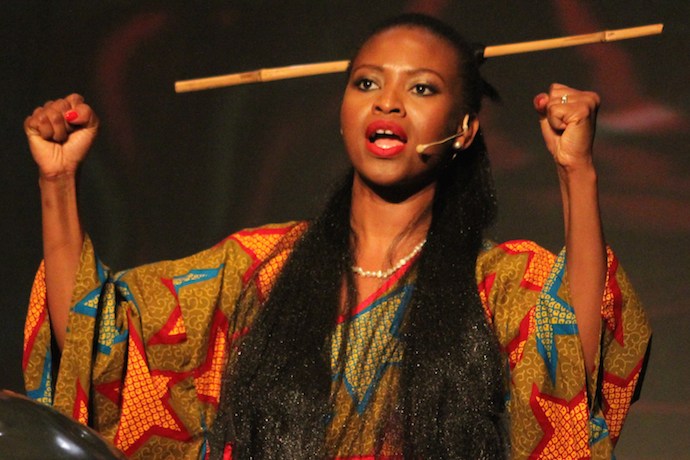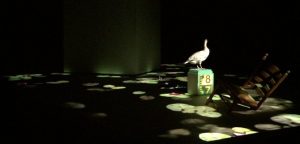
The first Nigerian pidgin opera: Helen Parker-Jayne Isibor’s Song-Queen, part of the Tete a Tete festival 2015
By Simon Fearn
What is opera? Vocal powerhouses delivering breath-taking arias? Or perhaps a staid world of black-tie and elitism? Whether a fan or non-believer, you’re likely to think of the great achievements of 18th and 19th Century opera, but can this most old-fashioned of art forms adapt and respond to the twenty-first century?
The Tête a Tête opera festival is an encouraging sign that contemporary opera is alive and well. The world’s largest community for new opera kicks off its 10th anniversary at King’s Cross from late July until early August. ‘With Tête a Tête I tried to reclaim the word opera like the word ‘queer’,’ explains the festival’s founder and artistic director Bill Bankes-Jones. ‘It’s become so tainted with chandeliers and champagne.’
Partly due to the scarcity of arts funding, Tête a Tête is a symptom of a shift away from opera as a large-scale, vastly-expensive spectacle. Smaller, more intimate operas are now ‘the place to go to make things happen.’ This also makes Tête a Tête’s opera lighter on its feet and more responsive to the current political climate. ‘Brexit, immigration and the class divide that’s hitting us’ are major themes at this year’s festival, Bankes-Jones tells me. ‘My festival is reacting in a way that [more heavily-funded] programs built three years ago aren’t capable of.’
Even if the desire is for experiments in opera to push things forward, because the processes are a bit nineteenth-century then sometimes, despite best intentions, that doesn’t happen
The best example of this responsivity is perhaps Iranian composer Soosan Lolavar’s ID, Please, an opera about immigration that premiers at this year’s festival. The piece recently hit headlines when Trump’s travel ban prevented Lolavar from attending the workshop of her own opera – further proof, if it was needed, of the opera’s incisive relevance. In recent years, Tête a Tête has also been at the forefront of diversifying opera. In 2015 the festival played host to the first Nigerian pidgin opera by Helen Parker-Jayne Isibor. It is works like these that draw in an audience ‘totally different from your Royal Opera House audience because it’s speaking to a different community.’
Language and subject matter are easy ways to keep opera relevant, but Bankes-Jones is sceptical about more radical experimentation. ‘What’s been very exciting recently is that all boundaries have been pushed, certainly in terms of musical style,’ he says. ‘Now it’s time to look into our past and see what really works.’ When programming the festival, Bankes-Jones often finds that works promising to radically reinvent opera leave him cold, with experimentation getting in the way of ‘the world you’re creating with all this music and voice. There’s a string of phrases like ground-breaking, avant-garde, innovative – everybody says that! I’m not a great believer in innovation; you should just do good work.’
Is there nothing new under the sun in the opera world? I put the question to baritone, cellist and actor Matthew Sharp, who has starred in operas since he was cast as the Page Boy in Verdi’s Falstaff aged six. ‘Personally I haven’t seen anything that opens up a whole new way of doing opera’s ritual of song, dance and storytelling that I’ve never thought of before,’ he replies. ‘Even if the desire is for experiments in opera to push things forward, because the processes are a bit nineteenth-century then sometimes, despite best intentions, that doesn’t happen.’
Far from being anachronistic, however, Sharp believes opera in its current form is the antidote to many of the discontents of the modern age. ‘In this country it feels like the capacity for intimate, inexpensive portable things is where opera can go,’ he explains. ‘There’s so much bombardment of the senses that the acoustic quality of opera singing is its special power. That’s where the soul, and the humanity and all that fallibility lies – up close and personal. There’s literally nothing else like that.’

The finale of 1513: A Ship’s Opera
One of the main deterrents of more radical experimentation is that if you change opera too much it loses its meaning – throwing the baby out with the bathwater. Take 1513: A Ship’s Opera (2013), a 14-hour long journey down the Thames which used ship’s sirens, bells and whistles as instruments. It’s a far cry from Sharp’s definition of opera as ‘the ritual of song, dance and storytelling’ and, as daring as its ‘anything goes’ attitude is, would anyone refer to the piece as an opera if it didn’t explicitly declare itself as such?
I spoke to video artists Jules van Hulst and Douwe Dijkstra of 33 1/3 Collective, a group that entered the opera world almost by accident and are now at its cutting edge. Their first foray into opera, 2011’s BlueBeard (loosely inspired by Bartók’s Bluebeard’s Castle), featured no live music, only a hallucinogenic sequence of surreal, projected images with a pre-recorded score. Was it opera? Dijkstra and van Hulst don’t particularly care. ‘There are things opera-makers don’t want to change because it’s part of the identity of what they’re doing,’Dijkstra explains. ‘People will say it’s not opera anymore – it’s music theatre. We don’t care about the label when we are making things.’
The group’s upcoming piece Depot puts the props and scenery of large-scale, traditional operas at its heart in a bid to question the ‘hierarchy’ of conventional opera: music at the core, then the libretto, and then the ‘cosmetics’ of what happens on stage. ‘Everything should be just as significant, because all of these media combined are trying to tell one story,’ van Hulst argues.

A Scene from 33 1/3 Collective’s Bluebeard
According to Dijkstra and van Hulst, tradition often prevents opera-makers from effectively and inventively using the vast means that are often at their disposal. Van Hulst gives the example of ‘your average libretto surtitle. You take it for granted that above the stage there’s some text that’s scrolling by so you’re able to follow the story. Why not use it as a prop? Why can’t it say something else that contradicts what’s been sung? These are really simple ideas that can be funny and playful. People say you’re messing with the traditions and trying to make a statement, but it’s also just trying to use what’s already there.’
It is impossible to definitively define opera, but perhaps one should be wary of both over-conservative traditionalism and musical free-for-all. Opera is clearly a special art-form, and in the future it is likely to retain at least some of the characteristics familiar to audiences of Handel and Vivaldi. ![]()
The Tete a Tete 10th anniversary season runs at The Place and RADA Studios from July 24 – August 13